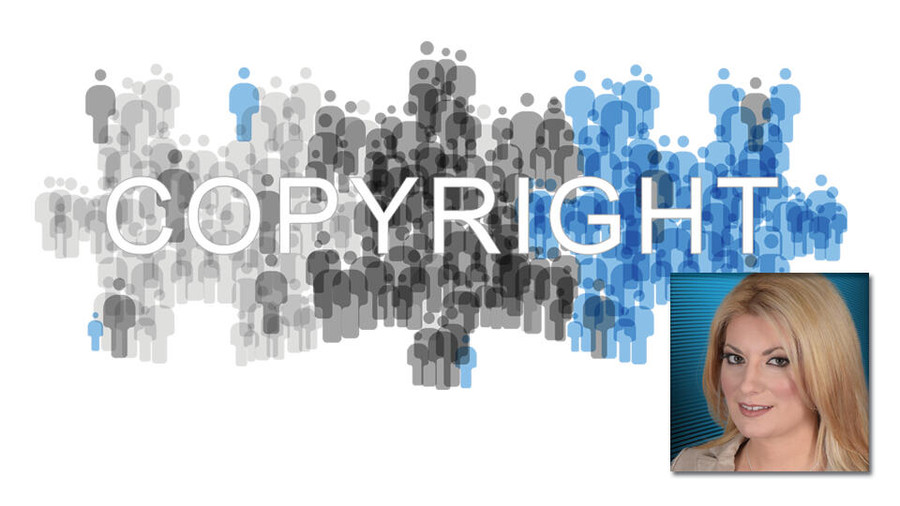It can be surprising how many aspects of a video are covered by separate copyrights or other intellectual property (IP). Whether you are an established studio or fledgling clip artist, it’s important to understand the anatomy of the legally protectable elements that make up a porn video. It’s even more important to make sure you own them…
According to the letter of the law, copyright is a form of IP that exists in an “original” creative work “fixed in any tangible medium” (CD, video, etc.). Copyright vests in the author (i.e. creator) absent a contract otherwise, typically called a “work-for-hire” agreement. And, there can be many components of a single video that are independently copyrightable.
But let’s start at the beginning, shall we? The script, as in the words that the actors and actresses will speak in the film, is subject to copyright and the script writers own the copyright. It gets more complicated, though, when an actor changes a line during recording — guess what? Now, they might be an author of the script too!
The video recording itself is also subject to copyright. The videographer is an author in that aspect. Sounds simple right? Well, let’s make it complicated again, and bring in a separate video editor to edit the various scenes into a single movie. If the editor is using their own creative judgment without following instructions provided by another person, that editor may be an author as well.
Note that I’ve used the word “may” and “might” in the scenarios above because, like much of the law, outcomes depend on the exact facts of the circumstances of each case.
Musicians are authors of the music they create. The area of music rights is a complicated part of the law, in and of itself. Like a video, a song has many separate protectable elements. And when it comes to videos, the synchronization rights, or “sync rights,” to music are important. These are the rights to synchronize a musical piece to a video. If you are using a prerecorded piece for your film or clip, you’ll need to obtain sync rights. It might be difficult to get such rights to a mainstream song for a pornographic movie. In some cases, you may hire a musician or band to write and record music for your production. That musician (or team) still has full rights to that music, unless you get a written agreement transferring those rights….
So, you’ve got your video — now, how about the still-photos, and that all-important cover image? The photographer owns the copyright in any photos they take. A graphic designer and/or editor could share in that copyright, as well, when editing and adding graphics or text to an image.
So, if you are a studio or clip artist, get a work-for-hire agreement from every person who contributes to any creative aspect of the video or promo images — before they begin work. A work-for-hire agreement will vest copyright in the hiring party, rather than the author. If you miss that step, get a copyright transfer agreement afterward. Then, file for a copyright registration with the U.S. (or other country’s) Copyright Office to evidence your rights.
Another form of IP is trademark, which protects logos, slogans and other symbols used in “commerce.” Typically, the title of a single work (i.e. one movie) cannot be protected by trademark (or copyright, for that matter). However, a title of a series of works can be trademarked. Accordingly, if you are producing multiple movies or clips under a single series title, that series title can be protected by trademark. Apply for a trademark registration at the U.S. (or other) Patent and Trademark Office (USPTO) to prevent others from using a confusingly similar series name.
Related to intellectual property rights, but a different legal concept, are “publicity rights” of the actors and actresses that appear in a film. Publicity rights are the rights of an individual in their likeness (image), voice and name. In the U.S., the exact scope of these rights is subject to state law, so it can vary. In general though, the laws say that an individual gets to control the use of their image, voice and name for commercial endeavors. Therefore, you’ll need a model release agreement for purposes of the film or clip and any still-images. Get this from all actors, actresses, models and voice-overs, etc.
Whew! That’s a lot of different items that need to be considered when producing a video. The moral of this story is to get written agreements relating to copyright from everyone who makes a creative contribution (no matter how insignificant it may seem in some instances), as well as model releases where applicable. Get yourself or your company registrations for the respective copyrights, and trademark rights, if present. You’ll be happy you did in the long-run.
Disclaimer: The content of this article constitutes general information, and is not legal advice. If you would like legal advice from Maxine Lynn, an attorney-client relationship must be formed by signing a letter of engagement with her law firm. To inquire, visit Sextech.lawyer.
Maxine Lynn is an intellectual property (IP) attorney with the law firm of Keohane & D’Alessandro, PLLC, having offices in Albany, New York, USA. She focuses her practice on prosecution of patents for technology, trademarks for business brands and copyrights for creative materials. Through her company, Unzipped Media, Inc., she publishes the Unzipped: Sex, Tech & the Law blog at SexTechLaw.com and the Unzipped: The Business of Sex podcast at Businessof.sex.






